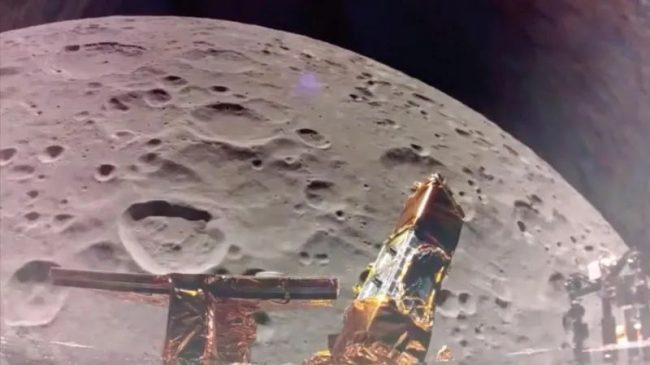A private spacecraft has successfully landed on the Moon, marking only the second time a commercial vehicle has reached the lunar surface.
Blue Ghost, launched by US firm Firefly Aerospace on 15 January, was designed to explore the Sea of Crises, a massive crater visible from Earth. The mission is part of an ongoing collaboration between NASA and private companies aiming to expand commercial space exploration.
According to the BBC, the achievement comes amid growing private sector involvement in lunar missions. Intuitive Machines, another private firm, is set to land its Athena spacecraft near the Moon’s south pole in the coming days.
Intuitive Machines was the first private company to land on the Moon, with its Odysseus spacecraft reaching the surface on 22 February last year.
However, that mission was short-lived after the spacecraft landed on a crater slope, broke its landing gear, and toppled over.
By contrast, Blue Ghost’s landing was smooth after orbiting the Moon for the past two weeks. Firefly Aerospace staff at the company’s Texas headquarters erupted into cheers and applause as confirmation of the successful landing came through.
Dr Simeon Barber, a planetary science researcher from the Open University, described Blue Ghost as “essentially the first successful private venture to the Moon,” as the spacecraft remained intact and responsive.
He told BBC Breakfast: “[They’ve] demonstrated a technology for landing on the surface of the Moon, the kind that had been forgotten after the Apollo era when we had astronauts on the [lunar] surface.”
Dr Barber highlighted the Moon’s significance for private firms, explaining that it serves as a testing ground for operating robotic instruments in extreme environments.
“By going to the Moon, we can learn how to run robotic instruments in space [and] in the really harsh environment of the Moon, which is at times hot and at times cold. It’s very dusty, there’s lots of radiation.”
He suggested that humans were likely to return to the Moon eventually but noted that financial constraints had delayed such missions since the last crewed landing on 19 December 1972, during Apollo 17.
“The Apollo missions were hugely successful,” he explained. “But they were ‘touch and go’ missions.” Astronauts could only stay for three days before leaving, as costs ran into billions of dollars. “That’s not sustainable,” he said.
ALSO READ: UK Prime Minister announces £1.6bn missile in support of Ukraine
Dr Barber also pointed to the role of private companies in reducing costs through competition, which could lead to cheaper landers and innovations such as extracting lunar resources like water for astronauts.
The path to commercial lunar exploration has not been without setbacks. Astrobotic Technology, another US firm, was the first private company to attempt a Moon landing in January 2024.
However, its lander suffered a suspected fuel leak and crashed back to Earth, disintegrating in the southern Pacific Ocean.
ALSO READ TOP STORIES FROM NIGERIAN TRIBUNE
WATCH TOP VIDEOS FROM NIGERIAN TRIBUNE TV
- Let’s Talk About SELF-AWARENESS
- Is Your Confidence Mistaken for Pride? Let’s talk about it
- Is Etiquette About Perfection…Or Just Not Being Rude?
- Top Psychologist Reveal 3 Signs You’re Struggling With Imposter Syndrome
- Do You Pick Up Work-Related Calls at Midnight or Never? Let’s Talk About Boundaries






